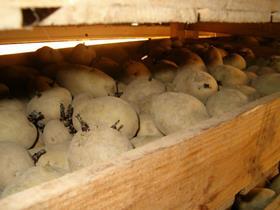
What is believed to be a last-minute decision by Egyptian seed potato importers to ban imports of tubers over 55mm has left British growers with surplus crop and the possibility of lower returns.
As one of the largest markets for British seed potatoes, both for domestic production and re-export, Egypt’s decision will have a major impact across the sector, and has been labelled “disappointing” by some suppliers.
It is not clear why the decision was made, although there is speculation that it may have been an attempt to manipulate market prices. Suppliers have stressed that, while Egyptian importers are well within their rights to change sizing specifications, the fact it was done so late in the season has been damaging to the British sector. Policy adviser at NFU Scotland, Peter Loggie, said varieties such as Hermes are grown specifically for the Egyptian market, and the new size rules means growers do not have enough time to make other export plans. “It seems to have been done for market manipulation purposes,” he said. “It does mean that the price will now be higher, so it may be compensated for slightly.”
Head of seed and export at AHDB Potatoes, Robert Burns, said: “Potential impact depends on variety but overall it may depress exports to Egypt by ten to fifteen percent. Reduced seed for this market is already affecting prices, so impact to our exporters may be softened by increased financial returns.”
A source close to the seed potato industry told FPJ that up to 20 per cent of crops will exceed the 55mm new import specification. The reason for the change might be because British seed potatoes appear more expensive this year on international markets, because of the exchange rates, so Egyptian importers are looking to increase margins, the source added.
“The most common tuber size is between 35 and 55mm so they are within their rights, but we don’t really know why they did it,” the source said. “Most varieties have further markets but it’s disappointing that we were told quite late in the day. If they’d told us earlier it may have had less of an impact.” The source added that returns to growers may be down this year as a result. “Had we known a bit earlier we could have planted more specifically,” the source added.
Loggie said that the Egyptians have been asked whether any other changes to specifications were in the pipeline and they had said no.



